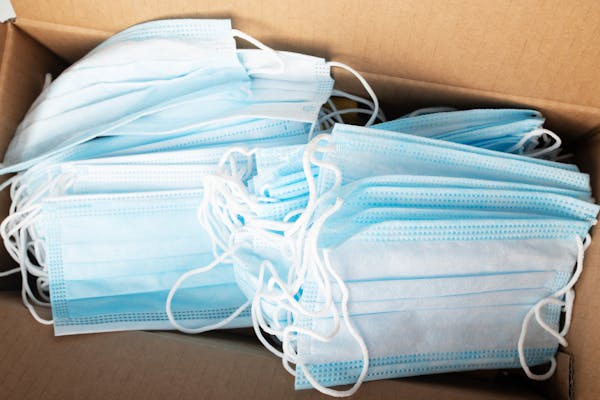Minneapolis and St. Paul quietly reconciled themselves Thursday to the return of mask mandates with seemingly little outrage over what has been a volatile issue nationwide, and both cities were considering as their next steps requiring proof of vaccination in some public places.
Before Minneapolis' indoor mask requirement took effect Thursday afternoon, Jeff Hatzenbeller, a Ham Lake resident who works in downtown Minneapolis, stood unmasked in the skyway, chatting with another man in no mask. He seemed to reflect the views of many.
"I've never had a problem with the mask thing, myself," he said.
On Wednesday, Mayor Jacob Frey signed an emergency regulation reinstating a mandatory mask policy requiring patrons, employees and visitors in the city to wear a mask in all businesses and places of public accommodation. St. Paul Mayor Melvin Carter imposed a similar mandate, but it's less far-reaching, covering only city-licensed businesses such as bars and restaurants. Both took effect at 5 p.m.
As the clocked ticked past 5 p.m. on Thursday, signs announcing the policy went up on the doors of the Marshalls store inside City Center downtown, as an unmasked Minneapolis police officer in uniform looked on.
Similar signs went up at the Candyland store nearby on S. 7th Street. Trisha Quaale, whose family owns the store and another in downtown St. Paul, said she doesn't expect to have much trouble from customers.
"Ninety-five percent of the people today have been wearing a mask," she said.
Meanwhile, both cities are considering going beyond masks to require proof of vaccination in some public places. Carter is considering an executive order that would mandate certain types of businesses to require proof of vaccination for entry, city spokesman Peter Leggett said Thursday. A handful of U.S. cities, from New York to Los Angeles, have already rolled out similar policies in an effort to boost vaccination rates and prevent the spread of the virus.
Minneapolis officials are also considering whether they should implement a similar policy.
"Public health data is continuing to guide our policymaking throughout the pandemic," Frey said in a statement. "Our teams are presently consulting with other cities that have already implemented such policies and discussing available options with neighboring jurisdictions amid the current spike in COVID cases."
In St. Paul, the mask mandate appeared to make nary a ripple. At Perrier Wines and Liquors on Grand Avenue, several customers and the two clerks wore masks. But no one wanted to talk about it.
At Dusty's bar in northeast Minneapolis, a masked Brent Hanson was ready with some barstool philosophizing.
"The people that are resistant to vaccines feel that they're vindicated," he said, because of so-called "breakthrough" infections of people who have been vaccinated against the COVID-19 virus. But that's no reason to give up the fight against the virus, he added.
"The only way we're going to beat the virus is to give it no place to live," he said. "We have to stifle the virus."
Masking is important, he added — not to protect oneself, but to protect others. It's a civic duty, he said, just like other things we do as members of society.
"I pay taxes. I've been on jury duty," Hanson said. "I'll wear a mask."
Behind the bar, Justin Fowler said he wasn't too worried about his clientele fighting the mandate.
"I think largely the people who come in here are going to be cool about it," he said. But some pushback is unavoidable, he added, and he doesn't like being the enforcer.
"That's the thing that starts to wear on you," Fowler said.
Strong disagreement on masking came from Barbara Howard, a downtown Minneapolis resident who called the mandate "the dumbest thing ever."
Howard's two grandchildren, both vaccinated and wearing masks, caught COVID-19 at school. Given that, Howard was skeptical that a mask would protect her from the virus in the thinly trafficked skyway, where she was walking with her friend Sheryl Malone.
From now on, the pair said, they'll take their walks at the Mall of America in Bloomington.
While some residents mentioned the sometimes confusing directives from health officials, downtown barista Kate Sibila said that's to be expected in such a widespread health emergency.
"We haven't been through a major pandemic in 100 years," she said. "So, it's not surprising we have to learn how to deal with it."

Want to share info with the Star Tribune? How to do it securely

'Safe recovery sites' would offer syringes, naloxone and more to people using drugs. The plan could be in peril.
New Minnesota GOP leaders seek peace with party's anti-establishment wing

Who is Republican Lisa Demuth, Minnesota's first House speaker of color?

